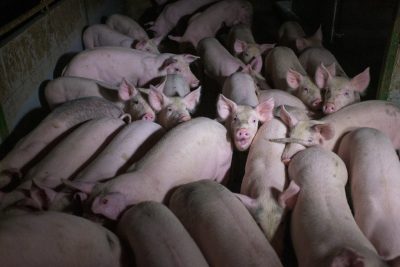UPDATED: Shamed Norwegian farmers and the huge meat producer and market regulator they collectively own, Nortura, now admit that far too many animals are suffering under terrible conditions in barns around the country. They’re asking for more unannounced inspections of farms raising pork by Norway’s food safety authority Mattilsynet.

“It’s important for us to have a good regulatory authority that can help reveal poor animal welfare in the industry,” Nortura’s board leader Trine Hasvang Vaag told state broadcaster NRK on Thursday.
That’s a marked change from earlier this week, when Vaag claimed both farm organizations and Nortura itself had “good systems” themselves for finding and tackling cases of animal welfare violations. Vaag claimed that horrific photos taken by animal rights activists who have carried out their own inspections were “not representative” of the Norwegian meat industry.
The animal welfare organization Nettverk for dyrs frihet (Network for Animal Freedom), has, however, uncovered repeated cases of animal abuse over the past five years. Fully 25 percent of barns inspected revealed pigs crammed together in small spaces, forced to sleep in their own waste on concrete floors and suffering serious, untended injuries and illness. News bureau NTB reported Wednesday that 24 pork producers have since reported four activists to the police for allegedly breaking into their barns late at night. The activists have claimed they entered through unlocked and open doors.
NRK covered the activists’ findings and followed up this week with reports of more than 200 confirmed animal welfare violations found in barns owned and operated by Norwegian farmers who are repeat offenders. They nonetheless have been allowed to keep operating for years. Promises made by both farming organizations including Norges Bondelag and Nortura that conditions would improve have not been kept.
‘We’ve closed our eyes’
Both the farm lobby and Nortura, which produces and markets the vast majority of Norwegian meat under the Gilde label and poultry under Prionor, have also continued to promote Norwegian agriculture with photos of idyllic farms and clean, playful animals grazing in scenic pastures, or roaming free in the mountains. They’ve built up an image over the years that Norwegian animals are far better off than those abroad, and it’s been an important means of defending Norway’s large farm subsidies, tariff protection from the competition posed by imported meat, and high food prices.
Reality is far different and “we’ve closed our eyes to what clearly occurs in Norwegian barns,” wrote commentator Jo Moen Bredeveien in newspaper Dagsavisen on Thursday. He noted how abusive farmers were supposed to be banned from the livestock business. “That hasn’t happened,” Bredeveien wrote, adding that the industry “has not managed to fix this on its own.”
Now Nortura and many farmers themselves fear consumers will lose confidence in Norwegian pork especially, just as the grilling season has begun. Consumers may also turn to only high-end independent speciality producers and small farms that let their animals roam freely. Nortura’s chief executive Kjell S Rakkenes admitted in newspaper Dagens Næringsliv (DN) that its Gilde unit’s advertising has not lived up to its own claims that “if Gilde’s name is on the package, you can be sure that the animals have had good care.” He even admitted that an ad campaign in 2019, which followed an earlier series of reports on animal welfare violation, amounted to “greenwashing.”
Nortura now promises it will “go through its routines” in an attempt to pay more attention to conditions on the farms delivering animals to its slaughterhouses. They’re also calling on the state, though its food safety authority Mattilsynet, to take on the expense of a major expansion of unannounced inspections and tougher punitive action against abusive farmers.
Authorities’ dilemma
Officials at Mattilsynet, meanwhile, claim they’re in an awkward position, charged with both trying to help farmers secure animal welfare while also able to shut them down. “It’s important that we are patient enough so that the farmer can become better,” the authority’s leader Ingunn Midttun Godal told NRK. Critics like Bredeveien respond that the state food regulator hasn’t done its job, and is sending a message that “we have to tolerate some animal abuse because farmers need to earn money.” There’s also been criticism over the high salaries earned by executives at Nortura, while many farmers themselves complain their incomes are much too low and they have to take extra jobs on the side.
Vaag, Nortura’s board leader, claims the authority “needs more resources” to be able to carry out enough unannounced inspections. “We’ve done a lot in the branch, but the activists’ photos show that we still have a long way to go,” she said. “We take that seriously. It shouldn’t be like this and it’s a challenge we must solve together.”
That includes the farmers’ organizations, where the largest, Bondelaget, is currently in the midst of its annual meeting after a turbulent spring, during which it refused to negotiate with the government over farmers’ annual financial aid from the state, eventually failed to win support in Parliament and had to settle for less than half of the more than NOK 2 billion they’d demanded. Many farmers even revolted against Bondelaget on the grounds it hasn’t done enough to boost farmers’ income over the years.
It’s also now calling for more inspections by Mattilsynet. The new leader of Østfold Bondelaget, Ole-Kristian Bergerud, stated at the meeting that “I think it’s sad that activists are setting the agenda regarding Norwegian animal welfare. The Norwegian farmers must tackle this and clean up themselves on their own farms and in their own business. If we’re going to have legitimacy in our production, we can’t have producers who don’t take good care of their animals every day.”
newsinenglish.no/Nina Berglund

